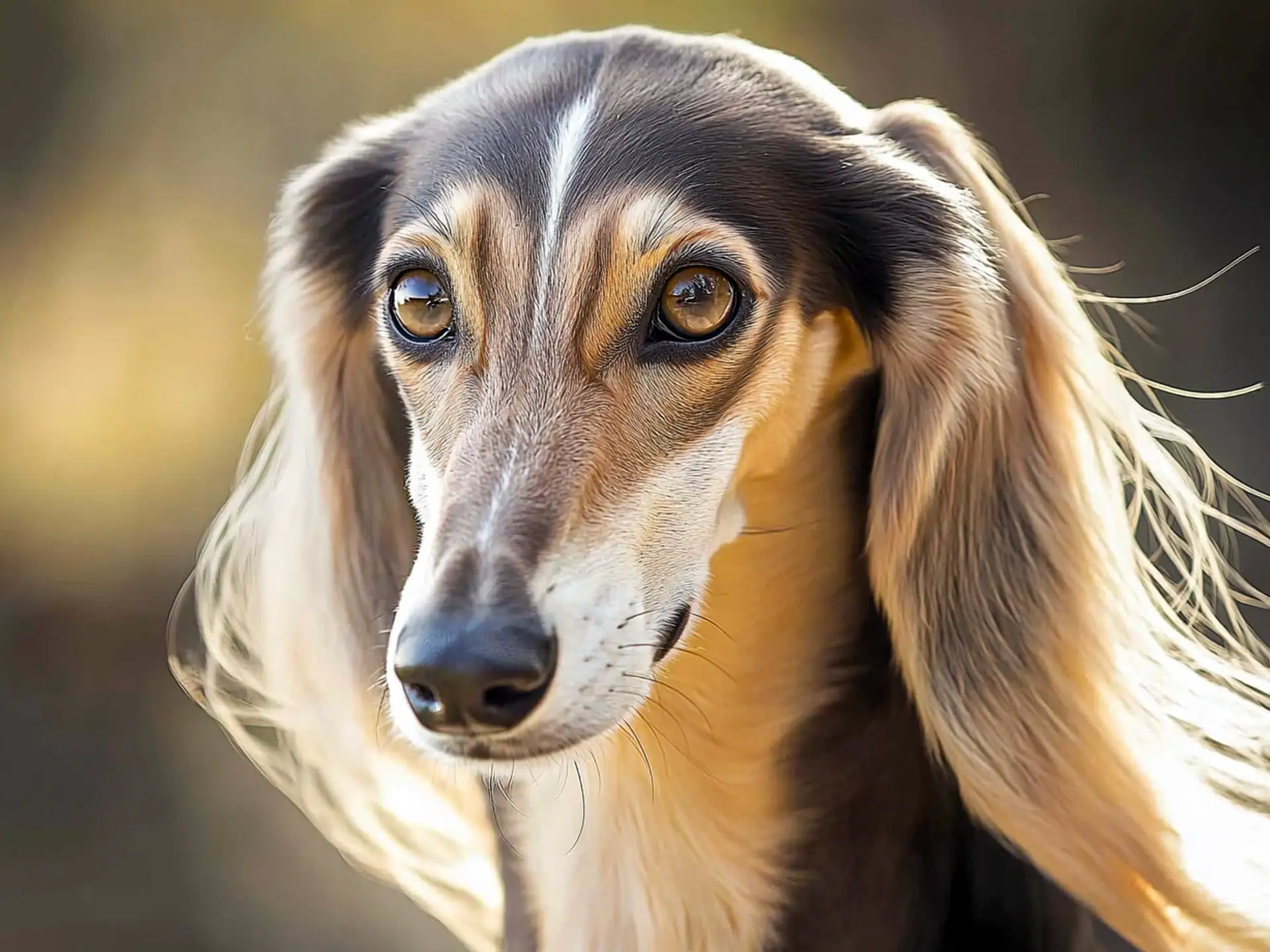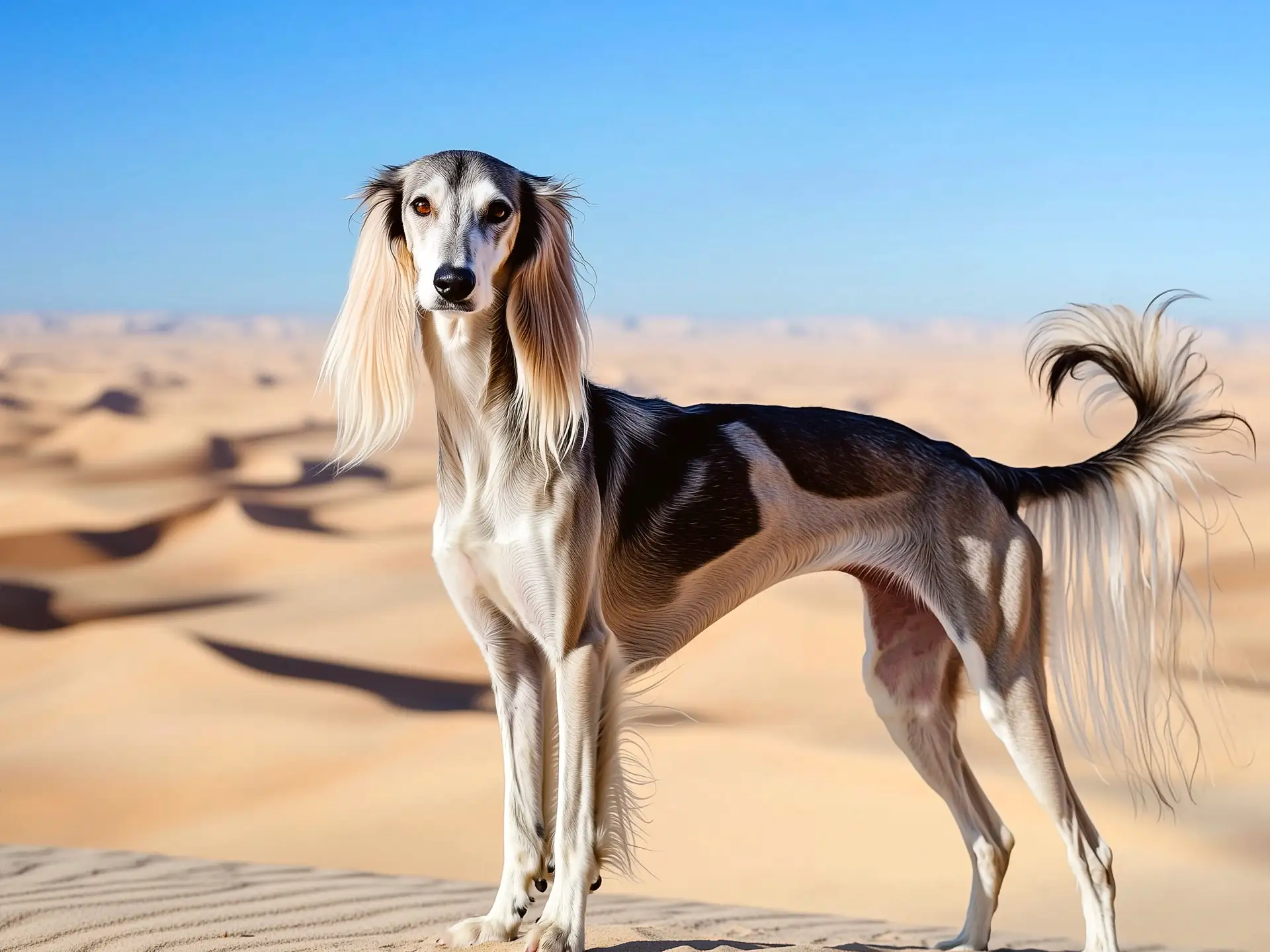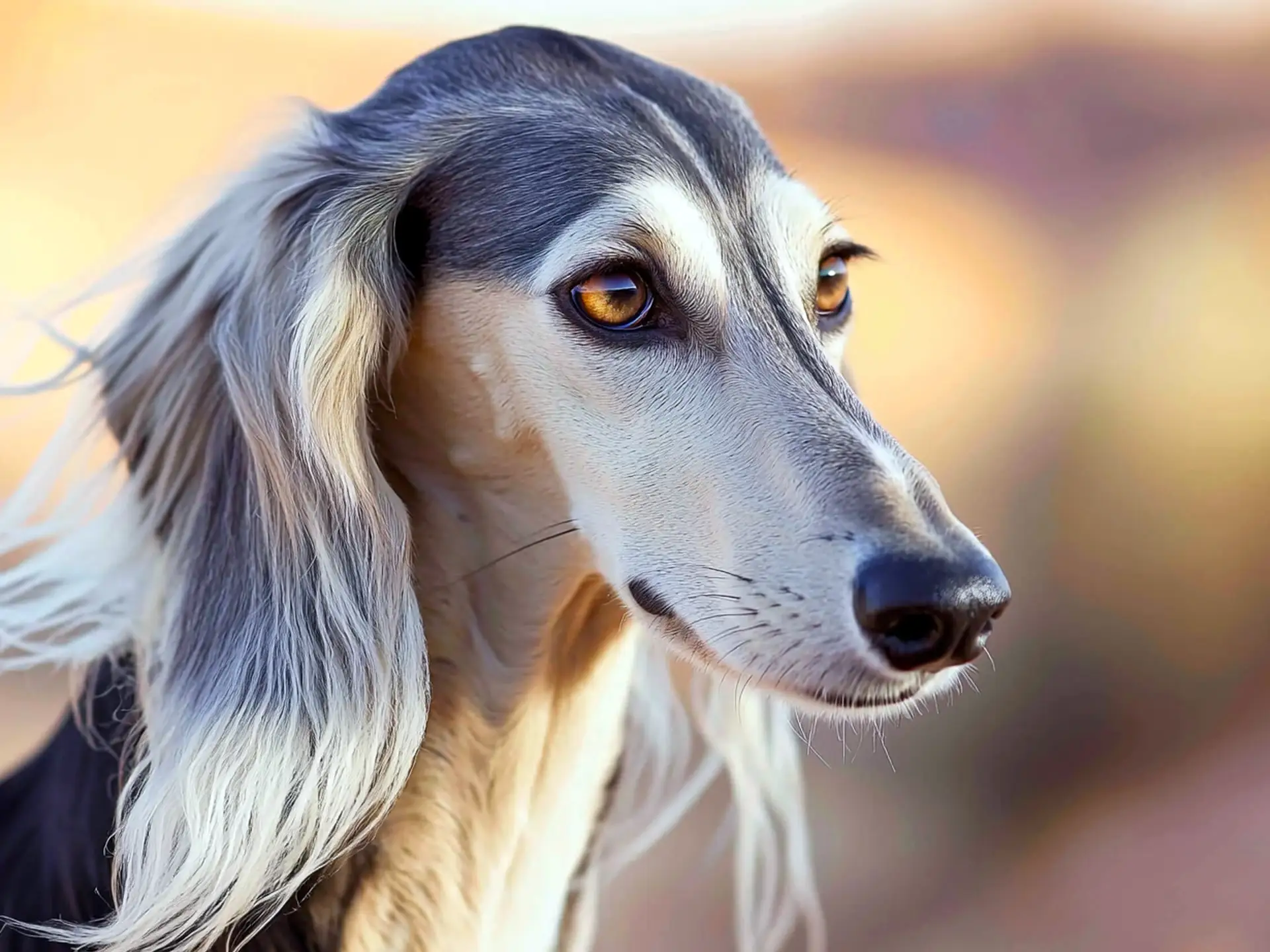Saluki Dog Breed Info & Overview
The Saluki, often described as a living piece of history, is one of the oldest and most graceful dog breeds. With their slender bodies, silky coats, and regal demeanor, these elegant hounds look like they’ve stepped straight out of an ancient mural. Known for their independence, loyalty, and athleticism, Salukis combine beauty and function, making them a truly remarkable companion in the canine world.
Characteristics
Pictures
Breed History
Dating back thousands of years, the Saluki is believed to be one of the oldest dog breeds known to man. Ancient artifacts and carvings depict dogs resembling Salukis, showcasing their long-standing companionship with humans. They were highly prized by kings and nobility in ancient Egypt, Persia, and other Middle Eastern cultures.
Salukis were traditionally used by nomadic tribes for hunting game such as gazelles and hares, relying on their incredible speed and keen eyesight. Their ability to thrive in harsh desert climates made them invaluable companions. The breed’s name is thought to come from the ancient city of Saluq in Yemen, though its exact origins remain a bit of a mystery.
The Saluki was introduced to Europe in the early 20th century, captivating dog enthusiasts with its elegance and history. Recognized by the AKC in 1927, the breed has maintained its allure over the years. Despite its ancient roots, the Saluki remains relatively rare outside its native regions, adding to its unique appeal. If you’re interested in other rare dog breeds, check out our list.
Temperament, Personality
Salukis are known for their gentle and reserved nature. They form deep bonds with their families but may appear aloof with strangers. Unlike some breeds, they aren’t overly demonstrative with affection, but their loyalty runs deep. This independent streak reflects their history as hunters who often worked at a distance from their owners.
While they are generally calm indoors, Salukis have bursts of energy and love to run when given the opportunity. They possess a strong prey drive, so early socialization is key, especially if you have smaller pets at home. They can be good with children who understand and respect their sensitive nature.
Salukis appreciate a quiet and stable environment. Loud noises and chaotic settings may cause them stress. Patience and gentle handling go a long way with this breed. They are intelligent but may not always be eager to please, so creative and positive training methods work best.
Physical Characteristics
The Saluki is a sight to behold with its slim, athletic build and graceful movements. They have long legs, deep chests, and a slender waist, all designed for speed and endurance. Their heads are narrow with large, expressive eyes that often have a soulful gaze.
One of their most striking features is their silky coat, which can be either smooth or feathered. Feathered Salukis have long hair on the ears, tail, and legs, adding to their elegant appearance. Coat colors vary widely, including white, cream, fawn, red, grizzle, and tricolor combinations.
Their ears are long and hang close to the head, often with feathering in feathered varieties. Salukis carry themselves with an air of dignity and grace, moving with a light, effortless gait. Their physical design reflects their heritage as hunters built for speed over open terrain.
Health Issues
Salukis are generally healthy dogs but, like all breeds, they are prone to certain health conditions. One of the main concerns is cardiomyopathy, a heart condition that can affect their longevity. Regular veterinary check-ups are essential to monitor heart health.
Another health issue seen in Salukis is hemangiosarcoma, a type of cancer that affects the blood vessels. Early detection through routine screenings can improve treatment outcomes. Additionally, they may be sensitive to anesthesia due to their low body fat percentage.
Salukis can also be susceptible to eye conditions such as progressive retinal atrophy (PRA). Genetic testing is available for many of these conditions, so working with reputable breeders who screen their dogs is crucial. Maintaining a healthy diet and exercise routine also supports their overall well-being.
Grooming Needs
Salukis have relatively low grooming needs compared to other breeds. Their short, silky coats require minimal maintenance, with weekly brushing to remove loose hairs and keep the coat shiny. Feathered varieties may need a bit more attention to prevent tangles.
Bathing can be done as needed, typically every few months unless they get particularly dirty. Their ears should be checked regularly for signs of infection, especially in feathered Salukis where airflow is reduced. Dental hygiene is also important to prevent periodontal disease.
Due to their low body fat and thin skin, Salukis can be sensitive to cold weather. In cooler climates, they may benefit from a doggy sweater or coat during walks. Regular nail trimming is necessary to prevent overgrowth, which can cause discomfort or affect their gait.
Exercise Requirements
Despite their calm demeanor indoors, Salukis are athletes at heart and require regular exercise to stay happy and healthy. They thrive on daily walks and opportunities to run in a safe, enclosed area. Off-leash time should only be in secure spaces due to their strong prey drive.
Salukis excel in activities like lure coursing, which simulates the chase of small game and taps into their natural instincts. Mental stimulation is also important; puzzle toys and interactive games can keep their minds sharp and prevent boredom.
Without adequate exercise, Salukis can become restless and may develop undesirable behaviors. A minimum of one to two hours of physical activity per day is recommended. They are not well-suited for apartment living unless their exercise needs are diligently met.
Training Tips
Training a Saluki can be both rewarding and challenging due to their independent nature. They are intelligent but may not always see the point in repetitive commands. Positive reinforcement methods using treats and praise yield the best results.
Early socialization is crucial to help them become well-adjusted adults. Exposing them to a variety of people, places, and other animals can reduce timidity and potential aggression. Patience is key, as harsh training methods can damage their sensitive spirit.
Consistency and short, engaging training sessions work best. Incorporating activities they enjoy, such as running or chasing, can make training more appealing. Remember, building a strong bond based on trust is more effective than trying to dominate this breed.
Nutrition, Diet
Feeding a Saluki requires attention to quality over quantity. Due to their lean physique, they don’t need large amounts of food, but what they eat should be high in protein to support their muscle mass. Premium dog foods formulated for active breeds are ideal.
Portion sizes typically range from 1.5 to 2 cups of high-quality dry food per day, divided into two meals. Overfeeding can lead to obesity, which is detrimental to their joints and overall health. Monitoring their weight and adjusting portions as needed is important.
Some Salukis can be picky eaters, so finding a diet that suits their palate may take some experimentation. Including omega-3 fatty acids can promote a healthy coat and skin. Always ensure they have access to fresh water, especially after exercise.
Adoption, Breeders
If you’re considering adding a Saluki to your family, it’s crucial to find a reputable breeder who prioritizes health and temperament. The Saluki Club of America provides extensive information and can help you find responsible breeders.
Adoption is also an option, with organizations like Saluki Tree of Life Alliance (STOLA) dedicated to rescuing and rehoming Salukis in need. They can help match you with a dog that fits your lifestyle and provide valuable support.
Avoid purchasing from pet stores or online sellers without verifiable credentials. Visiting the breeder, meeting the puppy’s parents, and asking about health clearances are essential steps. A good breeder will be just as interested in you as you are in their dogs.
Family Pet?
Salukis can make wonderful family pets for those who understand their unique needs. They are affectionate with their families but may be reserved around strangers. Their gentle nature suits households with older children who can interact calmly and respectfully.
Due to their high prey drive, caution is advised with smaller pets like cats or rodents. Early socialization can help, but supervision is essential. They typically get along well with other dogs, especially those of similar size and energy levels.
Salukis appreciate a peaceful home environment. They are not the best fit for bustling households with lots of noise and activity. Families who enjoy outdoor activities and can provide ample exercise will find a loyal and elegant companion in the Saluki.
Right For You?
Considering a Saluki? They are best suited for active individuals or families who can meet their exercise needs and appreciate their independent spirit. If you’re looking for a dog that enjoys cuddling all day, this may not be the breed for you.
Salukis thrive in homes with secure yards where they can run safely. Potential owners should be prepared for their occasional stubbornness and approach training with patience and positivity. Their low shedding and grooming needs are a bonus for the right household.
If you value grace, history, and a touch of the exotic in your canine companion, the Saluki might just be the perfect match. They offer a unique blend of elegance and athleticism that few breeds can rival.
Conclusion
Embodying thousands of years of history, the Saluki is a breed like no other. With their graceful appearance and independent nature, they offer a unique companionship experience. While they may not fit every household, those who appreciate their qualities will find a loyal and dignified friend. If you’re ready to embrace the elegance and spirit of the Saluki, they might just be the perfect addition to your life.
FAQs
-
What makes Salukis different from other sighthounds?
Salukis are unique in their aristocratic history, often considered “royal dogs of Egypt.” Their feathered coats and aloof nature set them apart from the more social and short-coated Greyhounds.
-
Do Salukis get along with other dogs?
Salukis generally get along well with other dogs, especially those of similar size and energy levels. Early socialization is important to foster positive interactions. However, due to their prey drive, caution is advised with small dogs.
-
Are Salukis good apartment dogs?
While Salukis can adapt to apartment living, they require significant daily exercise to stay happy. Their need for space to run means they’re better suited to homes with secure yards, but dedicated owners who meet their activity needs can make it work.
-
How fast can a Saluki run?
Salukis are one of the fastest dog breeds, capable of reaching speeds up to 42 miles per hour (68 km/h). Their speed and agility were historically used for hunting fast game like gazelles in open deserts.
-
What is the difference between a Saluki and a Greyhound?
While both are sighthounds, Salukis are generally more slender with feathered coats and have a more reserved temperament. Greyhounds are heavier, have short, smooth coats, and are often more sociable with strangers.
Breed Ratings
Salukis are intelligent but may not always be eager to please, making training a unique challenge requiring patience and creativity.
They enjoy playtime but are often more reserved compared to other breeds, preferring gentle activities over roughhousing.
With a strong need for regular exercise, Salukis are active dogs that thrive when given opportunities to run and explore.
Salukis have low shedding coats, making them relatively easy to maintain and a good choice for tidy households.
High prey drive is a hallmark of the breed, so caution is needed around small animals and when outdoors.
Their short, silky coats require minimal grooming, with weekly brushing sufficient to keep them looking their best.
While intelligent, their independent nature can make training a bit challenging; positive reinforcement is key.
Salukis prefer companionship and may become anxious if left alone for long periods; they thrive with human interaction.
Generally quiet, Salukis are not prone to excessive barking but may vocalize if bored or anxious.
Low droolers, Salukis are clean dogs that don’t leave a mess, contributing to their low-maintenance appeal.
They usually get along well with other dogs, especially when properly socialized from a young age.
Generally healthy, but potential owners should be aware of breed-specific health concerns and ensure regular vet care.



















